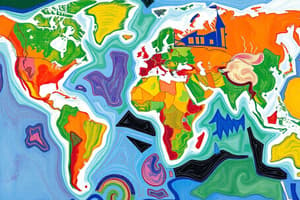Podcast
Questions and Answers
What does physical geography primarily focus on?
What does physical geography primarily focus on?
- Cultural interactions and urban areas
- Natural features and processes (correct)
- Political processes and spatial implications
- Human activities and their impact
Which of the following is a subtopic of human geography?
Which of the following is a subtopic of human geography?
- Urban geography (correct)
- Biogeography
- Geomorphology
- Climatology
What is the primary purpose of Geographic Information Systems (GIS)?
What is the primary purpose of Geographic Information Systems (GIS)?
- To analyze human behaviors
- To create paintings representing landscapes
- To study historical events in geography
- To map and analyze spatial data (correct)
Which concept refers to the flow of people, goods, and ideas across the Earth?
Which concept refers to the flow of people, goods, and ideas across the Earth?
What are some challenges associated with urbanization?
What are some challenges associated with urbanization?
How does human-environment interaction manifest?
How does human-environment interaction manifest?
Which term describes an area defined by common characteristics?
Which term describes an area defined by common characteristics?
What is one key reason why geography is important?
What is one key reason why geography is important?
Flashcards are hidden until you start studying
Study Notes
Definition and Scope
- Geography is the study of the Earth's landscapes, environments, and the relationships between people and their environments.
- It encompasses both physical and human aspects.
Branches of Geography
-
Physical Geography
- Focuses on natural features: landforms, climates, ecosystems, and natural resources.
- Subtopics include:
- Landforms (geomorphology)
- Climate and weather patterns (climatology)
- Biogeography (distribution of species and ecosystems)
- Hydrology (water bodies and their dynamics)
-
Human Geography
- Examines human activities and their impact on the Earth.
- Subtopics include:
- Urban geography (study of urban areas)
- Economic geography (distribution of economic activities)
- Cultural geography (interaction of culture and space)
- Political geography (political processes and spatial implications)
Tools and Techniques
- Cartography: The art and science of map-making.
- Geographic Information Systems (GIS): Software for mapping and analyzing spatial data.
- Remote Sensing: Use of satellite or aerial imagery to collect data about the Earth's surface.
- Field Studies: Direct observation and data collection in the natural environment.
Key Concepts
- Location: The geographic position of people and places; can be absolute (coordinates) or relative (in relation to other places).
- Place: The physical and human characteristics that define a location.
- Region: An area defined by common characteristics (cultural, physical, political).
- Movement: The flow of people, goods, and ideas across the Earth.
- Human-Environment Interaction: How humans adapt to and modify their environment.
Global Issues in Geography
- Climate change and its impact on ecosystems and human societies.
- Urbanization and its challenges such as housing and infrastructure.
- Globalization and its effects on local cultures and economies.
- Environmental degradation and conservation efforts.
Importance of Geography
- Provides insights into global interconnections and regional differences.
- Helps in planning and management of resources.
- Informs policy-making related to environmental and social issues.
- Enhances understanding of spatial patterns and processes.
Definition and Scope
- Geography studies Earth's landscapes, environments, and relationships between people and their environments, integrating both physical and human aspects.
Branches of Geography
-
Physical Geography: Concentrates on natural features, including:
- Geomorphology: Study of landforms.
- Climatology: Analysis of climate and weather patterns.
- Biogeography: Distribution of species and ecosystems.
- Hydrology: Dynamics of water bodies.
-
Human Geography: Investigates human activities and their environmental impacts, which encompass:
- Urban Geography: Examination of urban areas.
- Economic Geography: Analysis of economic activity distribution.
- Cultural Geography: Interaction of culture with space.
- Political Geography: Study of political processes and spatial implications.
Tools and Techniques
- Cartography: The discipline involved in map-making.
- Geographic Information Systems (GIS): Software utilized for mapping and analyzing spatial data.
- Remote Sensing: Gathering of data about the Earth's surface using satellites or aerial imagery.
- Field Studies: Direct observation and data collection in real-world environments.
Key Concepts
- Location: Refers to the geographic position of a place; can be absolute (specific coordinates) or relative (in relation to other locations).
- Place: Defined by physical and human characteristics unique to a location.
- Region: An area distinguished by common characteristics, which can be cultural, physical, or political.
- Movement: Involves the flow of people, goods, and ideas across different areas.
- Human-Environment Interaction: Analysis of ways humans adapt to and alter their environment.
Global Issues in Geography
- Climate Change: Affects ecosystems and human societies, posing significant challenges.
- Urbanization: Results in challenges related to housing and infrastructure.
- Globalization: Impacts local cultures and economies, leading to shifts in social dynamics.
- Environmental Degradation: Necessitates conservation efforts to combat ecological decline.
Importance of Geography
- Offers insights into global interconnections and regional variations, enhancing resource management and planning.
- Informs policy-making regarding environmental issues and social dynamics.
- Enhances comprehension of spatial patterns and processes, crucial for addressing contemporary challenges.
Studying That Suits You
Use AI to generate personalized quizzes and flashcards to suit your learning preferences.




